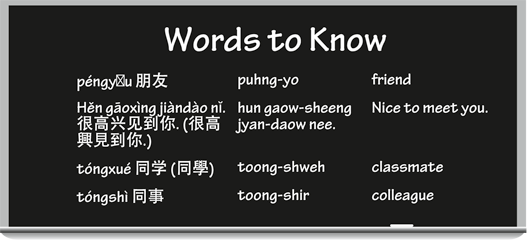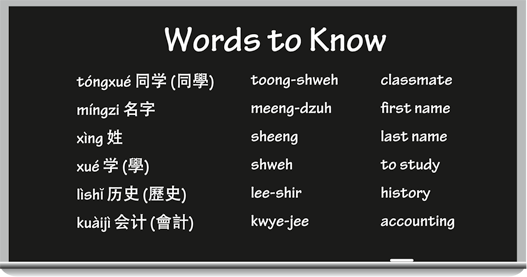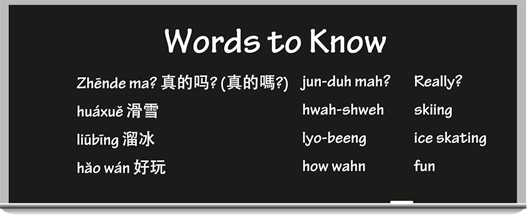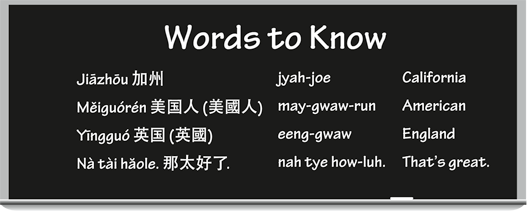Chapter 4
Getting Started with Basic Expressions: Nǐ Hǎo!
In This Chapter
 Introducing yourself and others
Introducing yourself and others
 Greeting and chatting with family, friends, and colleagues
Greeting and chatting with family, friends, and colleagues
Nǐ hǎo! 你好! (nee how) (Hello!/How are you?) Those are probably the two most important words you need to know to start a conversation with your Chinese neighbors, with your Chinese in-laws coming into town, with a Chinese classmate, or with airport personnel upon your arrival in China. When you say them, you take the first step in making new friends and establishing contact with just about anybody.
In this chapter, I show you how to start your new connection off with just the right words. The only other thing you have to do is smile. That’s something all people understand, no matter what country they’re from.
Making Introductions
Nothing beats making new friends at a wǎnhuì 晚会 (晚會) (wahn-hway) (party), a xīn gōngzuò 新工作 (sheen goong-dzwaw) (new job), on the dìtiě 地铁 (地鐵) (dee-tyeh) (subway), or just zài lùshàng 在路上 (dzye loo-shahng) (on the street). You may meet someone right after reading this chapter who becomes a good friend for life. This section gives you a head start in making a good first impression. Go ahead and practice these greetings to get ready for anything.
Acquainting yourself
When you make Chinese acquaintances or travel abroad, you soon discover that a little knowledge of even a few key expressions in their native language goes a long way in creating good will between your two cultures. Chinese people in particular are very appreciative of anyone who takes the time to learn their intricate and difficult language, so your efforts will be rewarded many times over.
You have options other than nǐ hǎo when you first meet someone, such as Hěn gāoxìng jiàndào nǐ. 很高兴见到你 (很高興見到你) (hun gaow-sheeng jyan-daow nee.) (Glad to meet you.) or Wǒ hěn róngxìng. 我很荣幸 (我很榮幸) (waw hun roong-sheeng.) (I’m honored to meet you.). Go ahead and tell the person your míngzi 名字 (meeng-dzuh) (name) and take the conversation from there.
Don’t know what to say after the first nǐ hǎo? Here are a few common opening lines to get you started:
 Nǐ jiào shénme míngzi? 你叫什么名字? (你叫甚麼名字?) (nee jyaow shummuh meeng-dzuh?) (What’s your name?)
Nǐ jiào shénme míngzi? 你叫什么名字? (你叫甚麼名字?) (nee jyaow shummuh meeng-dzuh?) (What’s your name?)
 Qǐng ràng wǒ jièshào wǒ zìjǐ. 请让我介绍我自己. (請讓我介紹我自己.) (cheeng rahng waw jyeh-shaow waw dzuh-jee) (Please let me introduce myself.)
Qǐng ràng wǒ jièshào wǒ zìjǐ. 请让我介绍我自己. (請讓我介紹我自己.) (cheeng rahng waw jyeh-shaow waw dzuh-jee) (Please let me introduce myself.)
 Wǒ jiào _____. Nǐ ne? 我叫 _____. 你呢? (waw jyaow _____. nee nuh?) (My name is _____. What’s yours?)
Wǒ jiào _____. Nǐ ne? 我叫 _____. 你呢? (waw jyaow _____. nee nuh?) (My name is _____. What’s yours?)
 Wǒ shì Měiguórén. 我是美国人. (我是美國人.) (waw shir may-gwaw-run.) (I’m an American.)
Wǒ shì Měiguórén. 我是美国人. (我是美國人.) (waw shir may-gwaw-run.) (I’m an American.)
Introducing your friends and family
You can help your friends make even more friends if you start introducing them to each other. All you have to do is say Qǐng ràng wǒ jièshào wǒde péngyǒu, Carl. 请让我介绍我的朋友, Carl. (請讓我介紹我的朋友, Carl.) (cheeng rahng waw jyeh-shaow waw-duh puhng-yo, Carl.) (Let me introduce my friend, Carl.) In addition to introducing your péngyǒu 朋友 (puhng-yo) (friend), you can introduce these important people:
 bàba 爸爸 (bah-bah) (father)
bàba 爸爸 (bah-bah) (father)
 lǎobǎn 老板 (老闆) (laow-bahn) (boss)
lǎobǎn 老板 (老闆) (laow-bahn) (boss)
 lǎoshī 老师 (老師) (laow-shir) (teacher)
lǎoshī 老师 (老師) (laow-shir) (teacher)
 māma 妈妈 (媽媽) (mah-mah) (mother)
māma 妈妈 (媽媽) (mah-mah) (mother)
 nán péngyǒu 男朋友 (nahn puhng-yo) (boyfriend)
nán péngyǒu 男朋友 (nahn puhng-yo) (boyfriend)
 nǚ péngyǒu 女朋友 (nyew pung-yo) (girlfriend)
nǚ péngyǒu 女朋友 (nyew pung-yo) (girlfriend)
 tàitai 太太 (tye-tye) (wife)
tàitai 太太 (tye-tye) (wife)
 tóngshì 同事 (toong-shir) (colleague)
tóngshì 同事 (toong-shir) (colleague)
 tóngwū 同屋 (toong-woo) (roommate)
tóngwū 同屋 (toong-woo) (roommate)
 tóngxué 同学 (同學) (toong-shweh) (classmate)
tóngxué 同学 (同學) (toong-shweh) (classmate)
 wǒde péngyǒu 我的朋友 (waw-duh puhng-yo) (my friend)
wǒde péngyǒu 我的朋友 (waw-duh puhng-yo) (my friend)
 zhàngfu 丈夫 (jahng-foo) (husband)
zhàngfu 丈夫 (jahng-foo) (husband)
Asking people for their names
Many situations call for informal greetings like Wǒ jiào Sarah. Nǐ ne? 我叫Sarah. 你呢? (waw jyaow Sarah. nee nuh?) (My name is Sarah. And yours?) or Nǐ jiào shénme míngzi? 你叫什么名字? (你叫甚麼名字?) (nee jyaow shummuh meeng-dzuh?) (What’s your name?), but you can show a greater level of politeness and respect by asking Nín guì xìng? 您贵姓? (您貴姓?) (neeng gway sheeng?) (Literally: What’s your honorable surname?) But if you’re asking this question of someone who’s younger than you or lower in social status, you can easily just say Nǐ jiào shénme míngzi? 你叫什么名字? (你叫甚麼名字?) (nee jyaow shummah meeng-dzuh?) (What’s your name?) Even though míngzi usually means given name, asking this question may elicit an answer of first and last name. Keep practicing these different opening lines to ask who people are, and you’re bound to make friends quickly (or you’re at least bound to get to know a lot of Chinese names).
Talkin’ the Talk
Eva:
Oscar, qǐng ràng wǒ jièshào wǒde péngyǒu David.
Oscar, cheeng rahng waw jyeh-shaow waw-duh puhng-yo David.
Oscar, allow me to introduce my friend David.
Oscar:
Nǐ hǎo. Hěn gāoxìng jiàndào nǐ.
nee how. hun gaow-sheeng jyan-daow nee.
Hi. Nice to meet you.
David:
Hěn gāoxìng jiàndào nǐ. Wǒ shì Eva de tóngxué.
hun gaow-sheeng jyan-daow nee. waw shir Eva duh toong-shweh.
Good to meet you. I’m Eva’s classmate.
Oscar:
Hěn gāoxìng jiàndào nǐ.
hun gaow-sheeng jyan-daow nee.
Nice to meet you.
David:
Nǐmen zénme rènshì?
nee-mun dzummuh run-shir?
How do you happen to know each other?
Eva:
Wǒmen shì tóngshì.
waw-mun shir toong-shir.
We’re co-workers.

Greeting and Chatting
When you dǎ zhāohu 打招呼 (dah jaow-who) (extend greetings), you’re sure to maintain and possibly even improve your connections with others. This goes for starting the day right with your àirén 爱人 (愛人) (eye-run) (spouse), showing respect for your lǎoshī 老师 (老師) (laow-shir) (teacher), keeping on the good side of your lǎobǎn 老板 (老闆) (laow-bahn) (boss), or paving the way for that deal with your new shēngyì huǒbàn 生意伙伴 (生意夥伴) (shuhng-yee hwaw-bahn) (business partner).
After the opening greeting, stick around to chat for a bit so you can get to know each other better. You can make new friends and find out more about each other through small conversations. This section gives you the important phrases to know.
Addressing new friends and strangers
In your hometown or home country, you may have plenty of lǎo péngyǒu 老朋友 (laow puhng-yo) (old friends), but in any other city or country, you need to get off on the right foot by addressing people the way they’re used to being addressed. You can get chummier as time goes by, but try to avoid sounding too friendly or presumptuous too soon.
You can always safely greet people in professional settings by announcing their last name followed by their title, such as Wáng Xiàozhǎng 王校长 (王校長) (wahng shyaow-jahng) (President [of an educational institution] Wang) or Jīn Zhǔrèn 金主任 (jeen joo-run) (Director Jin). Here are some other examples of occupational titles:
 bùzhǎng 部长 (部長) (boo-jahng) (department head or minister)
bùzhǎng 部长 (部長) (boo-jahng) (department head or minister)
 fùzhǔrèn 副主任 (foo-joo-run) (assistant director)
fùzhǔrèn 副主任 (foo-joo-run) (assistant director)
 jiàoshòu 教授 (jyaow-show) (professor)
jiàoshòu 教授 (jyaow-show) (professor)
 jīnglǐ 经理 (經理) (jeeng-lee) (manager)
jīnglǐ 经理 (經理) (jeeng-lee) (manager)
 lǎoshī 老师 (老師) (laow-shir) (teacher)
lǎoshī 老师 (老師) (laow-shir) (teacher)
If you don’t know someone’s title, you can safely address the person by saying his or her family name and then either Xiānshēng 先生 (shyan-shuhng) (Mr.) or Xiǎojiě 小姐 (shyaow-jyeh) (Miss).
Conversing around the clock
You can always say nǐ hǎo when you meet someone, but at certain times of the day, you can use specific ways to express your greetings.
When you meet family, friends, co-workers, or fellow students in the morning, you can say Zǎo. 早. (dzaow.) (Good morning.) or Zǎo ān. 早安. (dzaow ahn.) (Good morning. [Literally: early peace]).
In the evening or before you go to sleep, you can say Wǎn ān. 晚安. (wahn ahn.) (Good night.). Just as zǎo means early, wǎn means late. So if someone says Nǐ lái de tài wǎn. 你来得太晚. (你來得太晚.) (nee lye duh tye wahn.) or Nǐ lái de tài zǎo. 你来得太早. (你來得太早.) (nee lye duh tye dzaow.), he means You came too late. or You came too early.
Talkin’ the Talk
Julia and Christopher are good friends who meet in front of school one morning. Julia introduces Christopher to a new student named Lǐ.
Julia:
Zǎo. Nǐ zěnme yàng?
dzaow. nee dzummuh yahng?
Good morning. How’s it going?
Christopher:
Hěn hǎo, xièxiè. Nǐ ne?
hun how, shyeh-shyeh. nee nuh?
Very well, thanks. And you?
Julia:
Wǒ yě hěn hǎo. Zhè wèi shì wǒmen de xīn tóngxué.
waw yeah hun how. jay way shir waw-mun duh sheen toong-shweh.
I’m good, too. This is our new classmate.
Christopher:
Nǐ hǎo. Qǐng wèn, nǐ xìng shénme?
nee how. cheeng one, nee sheeng shummuh?
Hi. What’s your (sur)name?
Lǐ:
Wǒ xìng Lǐ. Nǐ jiào shénme míngzi?
waw sheeng Lǐ. nee jyaow shummuh meeng-dzuh?
My last name is Lǐ. What’s your (first) name?
Christopher:
Wǒ jiào Christopher. Nǐ xué shénme?
waw jyaow Christopher. nee shweh shummuh?
My name is Christopher. What do you study?
Lǐ:
Wǒ xué lìshǐ. Nǐ ne?
waw shweh lee-shir. nee nuh?
I study history. How about you?
Christopher:
Wǒ xué kuàijì.
waw shweh kwye-jee.
I study accounting.

Talking about the weather
Talking about the tiānqì 天气 (天氣) (tyan-chee) (weather) is always a safe topic in any conversation. In fact, it’s kind of the universal ice breaker. If the skies are blue and all seems right with the world, you can start by saying Jīntiān de tiānqì zhēn hǎo, duì bú duì? 今天的天气真好,对不对? (今天的天氣真好, 對不對? ) (jin-tyan duh tyan-chee juhn how, dway boo dway?) (The weather today sure is nice, isn’t it?) Here are some adjectives to describe temperature and humidity:
 lěng 冷 (lung) (cold)
lěng 冷 (lung) (cold)
 liángkuài 凉快 (涼快) (lyahng-kwye) (cool)
liángkuài 凉快 (涼快) (lyahng-kwye) (cool)
 mēnrè 闷热 (悶熱) (mun-ruh) (muggy)
mēnrè 闷热 (悶熱) (mun-ruh) (muggy)
 nuǎnhuó 暖和 (nwan-hwaw) (warm)
nuǎnhuó 暖和 (nwan-hwaw) (warm)
 rè 热 (熱) (ruh) (hot)
rè 热 (熱) (ruh) (hot)
The sìjì (suh-jee) (four seasons) — dōngtiān 冬天 (doong-tyan) (winter), chūntiān 春天 (chwun-tyan) (spring), xiàtiān 夏天 (shyah-tyan) (summer), and qiūtiān 秋天 (chyo-tyan) (fall) — all have their charms. They also all have their distinctive characteristics when it comes to the weather, which you can express with the following words in any conversation:
 bàofēngxuě 暴风雪 (暴風雪) (baow-fuhng-shweh) (blizzard)
bàofēngxuě 暴风雪 (暴風雪) (baow-fuhng-shweh) (blizzard)
 dàfēng 大风 (大風) (dah-fuhng) (gusty winds)
dàfēng 大风 (大風) (dah-fuhng) (gusty winds)
 duōyún 多云 (多雲) (dwaw-yewn) (cloudy)
duōyún 多云 (多雲) (dwaw-yewn) (cloudy)
 fēng hěn dà 风很大 (風很大) (fuhng hun dah) (windy)
fēng hěn dà 风很大 (風很大) (fuhng hun dah) (windy)
 léiyǔ 雷雨 (lay-yew) (thunderstorm)
léiyǔ 雷雨 (lay-yew) (thunderstorm)
 qínglǎng 晴朗 (cheeng-lahng) (sunny)
qínglǎng 晴朗 (cheeng-lahng) (sunny)
 qíngtiān 晴天 (cheeng-tyan) (clear)
qíngtiān 晴天 (cheeng-tyan) (clear)
 xià máomáoyǔ 下毛毛雨 (shyah maow-maow-yew) (drizzle)
xià máomáoyǔ 下毛毛雨 (shyah maow-maow-yew) (drizzle)
 xiàwù 下雾 (下霧) (shyah-woo) (fog)
xiàwù 下雾 (下霧) (shyah-woo) (fog)
 xiàxuě 下雪 (shyah-shweh) (snow)
xiàxuě 下雪 (shyah-shweh) (snow)
 xiàyǔ 下雨 (shyah-yew) (rainy)
xiàyǔ 下雨 (shyah-yew) (rainy)
 yīntiān 阴天 (陰天) (yeen-tyan) (overcast)
yīntiān 阴天 (陰天) (yeen-tyan) (overcast)
Talkin’ the Talk
Gerry and Jean discuss the weather in Harbin, one of the coldest places in northern China.
Jean:
Hā’ěrbīn dōngtiān hěn lěng. Chángcháng xiàxuě.
hah-are-been doong-tyan hun lung. chahng-chahng shyah shweh.
Harbin is very cold in the winter. It snows often.
Gerry:
Zhēnde ma?
jun-duh mah?
Really?
Jean:
Zhēnde. Yě yǒu bàofēngxuě. Xiàtiān hái hǎo. Bǐjiào nuǎnhuó.
jun-duh. yeh yo baow-fuhng-shweh. shyah-tyan hi how. bee-jyaow nwan-hwaw.
Really. There are also blizzards. Summertime is okay, though. It’s relatively warm.
Gerry:
Lěng tiān kéyǐ qù huáxuě, hái kéyǐ qù liūbīng. Nèmme Hā’ěrbīn dōngtiān de shíhòu dàgài hěn hǎo wán.
lung tyan kuh yee chyew hwah-shweh, hi kuh yee chyew lyo-beeng. nummah hah-are-been doong-tyan duh shir-ho dah gye hun how wahn.
In cold weather, you can go skiing or ice skating. So Harbin during the winter is probably a lot of fun.

Finding out where people are from
Wondering where people are from when you first meet them is natural. Maybe they hail from your hometown. Maybe your new friend’s mother and your father went to the same high school way back when. Whatever motivates you to pose the question, you ask it by saying Nǐ shì nǎr de rén? 你是哪儿的人? (你是哪兒的人?) (nee shir nar duh run?) (Where are you from?) To answer this question, you replace the word nǐ 你 (nee) (you) with wǒ 我 (waw) (I) and put the name of wherever you’re from where the word nǎr is.
Here’s a list of countries that may come up in conversation:
 Fǎguó 法国 (法國) (fah-gwaw) (France)
Fǎguó 法国 (法國) (fah-gwaw) (France)
 Měiguó 美国 (美國) (may-gwaw) (America)
Měiguó 美国 (美國) (may-gwaw) (America)
 Rìběn 日本 (ir-bun) (Japan)
Rìběn 日本 (ir-bun) (Japan)
 Ruìdiǎn 瑞典 (rway-dyan) (Sweden)
Ruìdiǎn 瑞典 (rway-dyan) (Sweden)
 Ruìshì 瑞士 (rway-shir) (Switzerland)
Ruìshì 瑞士 (rway-shir) (Switzerland)
 Yìdàlì 意大利 (ee-dah-lee) (Italy)
Yìdàlì 意大利 (ee-dah-lee) (Italy)
 Yuènán 越南 (越南) (yweh-nahn) (Vietnam)
Yuènán 越南 (越南) (yweh-nahn) (Vietnam)
 Zhōngguó 中国 (中國) (joong-gwaw) (China)
Zhōngguó 中国 (中國) (joong-gwaw) (China)
Talkin’ the Talk
Cynthia has just introduced herself to Adrienne at their mutual friend’s house. Cynthia asks Adrienne where she is from.
Cynthia:
Adrienne, nǐ shì nǎr de rén?
Adrienne, nee shir nar duh run?
Adrienne, where are you from?
Adrienne:
Wǒ shì Jiāzhōu rén. Nǐ ne?
waw shir jyah-joe-run. nee nuh?
I’m from California. How about you?
Cynthia:
Wǒ búshì Měiguórén. Wǒ shì Yīngguó Lúndūn láide.
waw boo-shir may-gwaw-run. waw shir eeng-gwaw lwun-dun lye duh.
I’m not American. I’m from London, England.
Adrienne:
Nà tài hǎole.
nah tye how-luh.
That’s great.

Taking (that is, rejecting) compliments
Chinese people are always impressed whenever they meet a foreigner who has taken the time to learn their language. So when you speak Zhōngwén 中文 (joong-one) (Chinese) to a Zhōngguórén 中国人 (中國人) (joong-gwaw-run) (Chinese person), he may very well say Nǐde Zhōngwén tài hǎole. 你的中文太好了. (nee-duh joong-one tye how-luh.) (Your Chinese is fantastic.) Instead of patting yourself on the back, however, you should be slightly self-deprecating in your response. Don’t give in to the temptation to accept the compliment easily and say Xièxiè. 谢谢 (謝謝). (shyeh-shyeh.) (Thanks.), because doing so implies that you agree wholeheartedly with the complimentary assessment. Instead, try one of the following replies. Each of them can be roughly translated as It’s nothing. or the equivalent of No, no, I don’t deserve any praise.:
 Guò jiǎng guò jiǎng. 过讲过讲. (過講過講.) (gwaw jyahng gwaw jyahng.)
Guò jiǎng guò jiǎng. 过讲过讲. (過講過講.) (gwaw jyahng gwaw jyahng.)
 Nálǐ nálǐ. 哪里哪里. (哪裡哪裡.) (nah-lee nah-lee.)
Nálǐ nálǐ. 哪里哪里. (哪裡哪裡.) (nah-lee nah-lee.)
 Nǎr de huà. 哪儿的话. (哪兒的話.) (nar duh hwah.)
Nǎr de huà. 哪儿的话. (哪兒的話.) (nar duh hwah.)
Saying goodbye
When it comes time to say goodbye, you can always say Zài jiàn. 再见. (再見.) (dzye jyan.) (Goodbye.). If you’re just leaving for a little while and plan to be back soon, you can say Yīhuǐr jiàn. 一会儿见. (一會兒見.) (ee-hwahr jyan.) (See you in a bit.). And if you won’t see someone until the next day, you can say Míngtiān jiàn. 明天见. (明天見.) (meeng-tyan jyan.) (See you tomorrow.). For a quick See you later., you can say Huítóu jiàn. 回头见. (回頭見.) (hway-toe jyan.). Here are some other phrases you can use to say goodbye:
 Míngnián jiàn. 明年见. (明年見.) (meeng-nyan jyan.) (See you next year.)
Míngnián jiàn. 明年见. (明年見.) (meeng-nyan jyan.) (See you next year.)
 Xiàge lǐbài jiàn. 下个礼拜见. (下個禮拜見.) (shyah-guh lee-bye jyan.) (See you next week.)
Xiàge lǐbài jiàn. 下个礼拜见. (下個禮拜見.) (shyah-guh lee-bye jyan.) (See you next week.)
 Xīngqī’èr jiàn. 星期二见. (星期二見.) (sheeng-chee-are jyan.) (See you on Tuesday.)
Xīngqī’èr jiàn. 星期二见. (星期二見.) (sheeng-chee-are jyan.) (See you on Tuesday.)
 Yílù píng’ān. 一路平安. (ee-loo peeng ahn.) (Have a good trip.)
Yílù píng’ān. 一路平安. (ee-loo peeng ahn.) (Have a good trip.)
For more days-of-the-week options to use in the next to last item in the list, head to Chapter 5.
 Fun & Games
Fun & Games
Activity 1: Here’s a list of words that got loose. See if you can put them back where they belong in the following text. The answers are in Appendix D.
míngzi 名字, bàofēngxuě 暴风雪 (暴風雪), jiàn 见 (見), Déguórén 德国人 (德國人), hǎo 好
Zǎo. Nǐ ____. Wǒde ______ jiào John. Wǒ shì __________. Jīntiān de tiānqì hěn hǎo. Méiyǒu ___________. Huítóu ______.
早。你 ——。 我的 —— 叫 John. 我是 ——。 今天的天气(氣) 很好。 没有 ——。 回头(頭) ——。
Activity 2: Match the situation with the appropriate expression. You can find the answers in Appendix D.
|
1. You see someone again after a long time. |
A. Hěn gāoxìng jiàndào nǐ. 很高兴见到你. (很高興見到你.) |
|
2. You see your friend in the evening. |
B. Yílù píng’ān. 一路平安. |
|
3. You see your teacher in the morning. |
C. Hǎo jiǔ méi jiàn. 好久没见. (好久沒見.) |
|
4. Someone compliments you on your new hairstyle. |
D. Wǎn ān. 晚安. |
|
5. Someone introduces you to his brother. |
E. Zǎo. 早. |
|
6. Your best friend is about to board a plane for France. |
F. Nǎr de huà. 哪儿的话. (哪兒的話.) |

 If a guy tells you his name in Chinese, you can be sure the first syllable he utters will be his surname, not his given name. So if he says his name is
If a guy tells you his name in Chinese, you can be sure the first syllable he utters will be his surname, not his given name. So if he says his name is 
 Chinese folks often instruct their young children to address older people as
Chinese folks often instruct their young children to address older people as